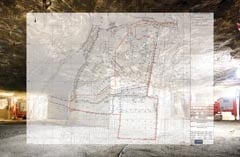Planning permissions secure Albion's Portland stone production for at least 30 years more
Albion Stone, one of the two quarry companies on the Dorset island of Portland extracting the famous limestone, has been given planning permission that should secure the company’s production of the stone for the next 30 years, at least.
Albion has secured a further two planning permissions to extend its mines on Portland, giving it three separate mining sites – at Jordans, Bowers and Stonehills.
Jordans and Bowers are mines extending from existing quarries while Stonehills is a new site. Stonehills should have been opened this summer but the planners want an opportunity for more archaeological digs before the site is disturbed and that had to wait until ground-nesting birds had finished raising their young.
The first of the new permissions allows an extension to Jordans Mine under the nearby road to extract stone from underneath a school playground and tennis courts. The extension should provide extensive reserves of Jordans Basebed, Whitbed and Roach stones.
The second planning permission allows Albion to extract from the last remaining area of the historical Bowers Quarry site. As part of Albion Stone’s commitment to sustainable growth, and being environmentally responsible, it surrendered the quarrying permission on the remaining virgin land of the quarry and applied for mining permission.
As part of the permission, the company has agreed with Natural England and Dorset Wildlife Trust to establish a calcareous grassland environment across the historic quarry site. The grassland will become a Site of Special Scientific Interest (SSSI).
Albion has also made an £18,000 donation to the Portland in Peril project, which aims to eradicate non-native plants that are smothering Portland’s unique limestone grasslands.
Albion Stone hopes to start extraction from these reserves this year. This will provide another 30 years worth of Bowers Basebed, Whitbeds and Roach to the masonry industry.
Michael Poultney, Managing Director of Albion Stone, says: “I can now stop spending money on planning permissions. This is an exciting time for the business, the culmination of plans set out nearly 20 years ago. We have sorted out our reserves and we are gearing up for a new phase at the business that involves extraction from mining operations only.
“We have spent 20 years doing planning applications, 10 years of trial mines and more than £1.8million getting to this point – a point that marks a fundamental shift in the extraction of Portland stone.
“We have taken on new employees who we are training to be able to work in the technically demanding mining operations using some of the most advanced dimension stone machinery. We have also spent over £1million at the factory so that we can process these new resources to the highest international standards.”
The machinery includes sophisticated Fantini saws for cutting blocks out of the mines. A fourth of these saws will be delivered shortly from Italy at a cost of nearly €450,000.
London is the main market for Portland limestone and Albion will be at the Natural Stone Show at ExCeL London 28-30 April next year, but the company is also trying to open markets overseas and will be exhibiting for the second year running at Marmomacc in Verona this month (24-27 September) and might exhibit at Xiamen in China next year.
l Portland Stone Firms, the other quarry company on the island, is currently at a Lands Tribunal contesting a Dorset County Council decision to stop it quarrying previously consented reserves of stone on a coastal strip of land. It operates Perryfield and Broadcroft quarries, which are not affected by the Lands Tribunal case. The company says each quarry has between 15 and 25 years of reserves left.

